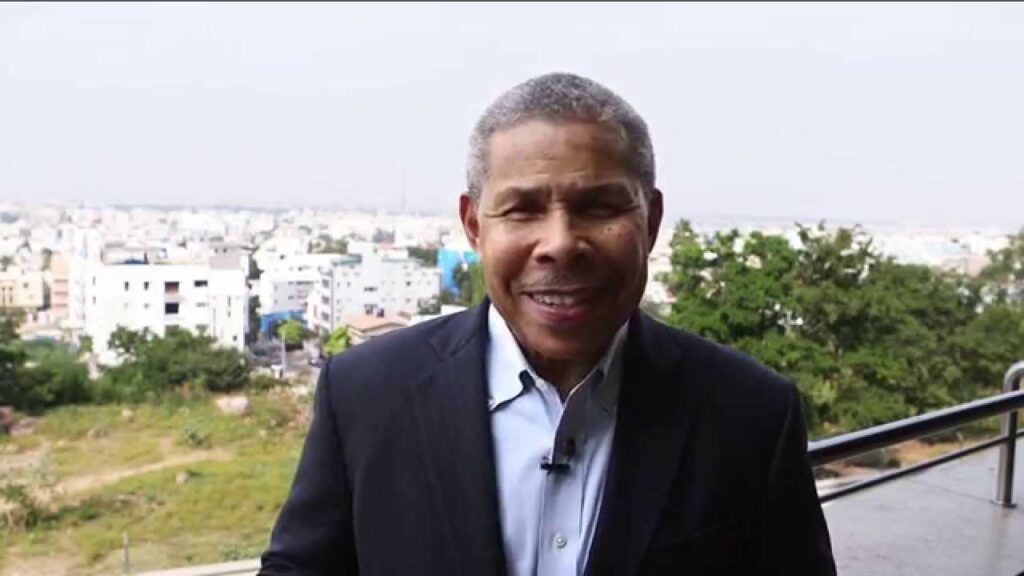
American evangelist Bill Winston is to be prohibited from entering India by the LRPF
In a significant legal move, the Legal Rights Protection Forum (LRPF), a prominent legal advocacy group, has taken a firm stand against American evangelist William Samuel Winston, commonly known as Bill Winston, by lodging a formal complaint with the Ministry of Home Affairs (MHA) of India. The complaint was filed based on allegations that Winston has repeatedly violated India’s visa regulations, particularly concerning foreign nationals engaging in religious activities. LRPF claims that Winston’s participation in events like the ‘Hyderabad Faith Conference’ constitutes a direct breach of Indian law, prompting them to seek a ban on his entry into the country.
Background: Bill Winston and His Activities in India
Bill Winston is a widely recognized figure in the world of evangelical Christianity, known for his teachings on prosperity, faith, and success. He is the founder of Bill Winston Ministries, which is based in Oak Park, Illinois, USA. For over a decade, Winston has been a frequent speaker at religious gatherings in various parts of the world, including India. One of the prominent events where he has been a regular presence is the ‘Hyderabad Faith Conference,’ an annual event held in Hyderabad. This conference, organized by a group of evangelical followers, aims to spread the message of Christian faith and attract large numbers of attendees from across the globe.
However, Winston’s continued participation in these events, despite his foreign national status, has drawn significant controversy. The crux of the issue lies in the alleged violation of the Foreigners Act of 1946, which governs the entry of foreigners into India. Specifically, Section 14(b) of the Foreigners Act prohibits foreign nationals holding any visa from engaging in religious activities while in India. The act was instituted to prevent foreign entities from influencing or interfering in the religious or political matters of the country. The LRPF has highlighted Winston’s repeated disregard for this law as a matter of grave concern.
LRPF’s Complaint: Violations of Indian Visa Laws
In its complaint to the Foreigners Regional Registration Officer (FRRO) of Hyderabad, LRPF pointed out that Bill Winston has been a regular participant in the Hyderabad Faith Conference, which has been taking place since 2010. The event is set to be held again from October 18 to 21, 2024, at the Sri Vivekananda Institute of Technology’s Auditorium in Secunderabad. LRPF specifically alleges that Winston’s involvement in religious activities like these directly contravenes Indian visa regulations, which prevent foreigners from engaging in any religious work or promoting religious ideologies while on tourist or business visas.
The complaint further details that Winston’s visa, which is likely a tourist or business visa, is not intended for participation in religious events, and his involvement in such conferences constitutes a blatant violation of the law. LRPF has urged the MHA to take immediate action by investigating the matter thoroughly and holding Winston accountable for his actions. The organization has also demanded that the Ministry of Home Affairs revoke Winston’s visa and prevent him from entering India in the future.
Wider Implications: The Debate Over Foreign Evangelism in India
The issue raised by LRPF also touches on a broader debate regarding the influence of foreign evangelists in India and their role in spreading religious ideologies. India, a secular nation with a rich and diverse religious landscape, has long been cautious about foreign entities and individuals who might attempt to promote or spread religious beliefs that could alter the fabric of its cultural identity. Religious gatherings organized by foreign nationals, especially evangelical preachers like Winston, often attract scrutiny due to concerns over foreign influence and the potential for social or political unrest.
Critics argue that such events sometimes cross the line between religious gatherings and proselytizing, potentially converting people to a foreign faith in violation of the country’s secular constitution. On the other hand, supporters of these gatherings contend that individuals like Bill Winston are simply sharing their message of faith and hope, contributing to global religious harmony. They argue that as long as foreign nationals are abiding by India’s legal frameworks, there should be no restrictions on their participation in religious events.
However, the LRPF’s stance emphasizes the need to protect India’s religious sovereignty and uphold the sanctity of its visa regulations. They argue that foreign nationals should not be allowed to exploit India’s visa system to engage in activities that go against the spirit of the Foreigners Act. The forum also pointed out that this case is not an isolated incident but part of a larger pattern of foreign evangelists exploiting the country’s hospitality for religious purposes. The LRPF is determined to bring attention to this issue and ensure that similar violations are not overlooked in the future.
The Ministry of Home Affairs and Its Role
The Ministry of Home Affairs (MHA) plays a crucial role in overseeing the enforcement of visa regulations in India. The MHA is responsible for ensuring that foreign nationals who enter the country do so within the parameters of the law. In recent years, the Ministry has come under increasing pressure to clamp down on foreign nationals who allegedly violate Indian laws related to religious activities, especially in cases involving influential religious figures like Bill Winston.
If the Ministry of Home Affairs takes up the LRPF’s complaint seriously, it could have far-reaching consequences for Bill Winston’s future trips to India. The Ministry has the authority to issue a ban on foreign nationals entering the country, particularly if they are found to be in violation of the Foreigners Act. Additionally, the Ministry could revoke the visas of individuals like Winston, thereby preventing them from participating in future religious events or conferences. The LRPF’s complaint is likely to trigger a legal and diplomatic process, with officials from both the Indian government and Winston’s ministry likely to present their arguments.
LRPF’s Broader Agenda and Future Plans
The LRPF’s actions are not limited to Bill Winston alone. The organization has expressed its commitment to ensuring that no foreign evangelist can take advantage of India’s visa system for religious proselytizing. LRPF plans to continue its advocacy for stronger enforcement of visa laws and has signaled that it will take action against any foreign nationals who violate the Foreigners Act.
To further its cause, LRPF has also announced plans to approach the Indian Consulate in Chicago, requesting the cancellation of Winston’s visa. By bringing this issue to the attention of international authorities, LRPF hopes to send a clear message to foreign evangelists that India’s legal frameworks must be respected. The organization believes that by taking a firm stand on this issue, it can help protect the cultural and religious integrity of India while upholding the rule of law.
Conclusion: A Legal and Social Debate
The case of Bill Winston’s alleged violations of Indian visa laws highlights a critical intersection of legal, social, and religious issues. While the Ministry of Home Affairs is tasked with ensuring the enforcement of laws governing foreign nationals, the broader societal implications of foreign religious activity in India remain a contentious subject. The LRPF’s complaint adds a new layer to the ongoing debate about the role of foreign evangelism in the country and the extent to which it should be allowed to influence the religious landscape.
As India moves toward the future, balancing the respect for religious diversity with the need to protect national laws will be crucial. This case is likely to set a precedent for future legal actions involving foreign nationals engaged in religious activities and could prompt a reevaluation of how India handles religious events and conferences involving foreign speakers. The outcome of this case will undoubtedly resonate not only within the legal circles but also among those who are closely following the evolving relationship between India and foreign religious organizations.
In a significant legal move, the Legal Rights Protection Forum (LRPF), a prominent legal advocacy group, has taken a firm stand against American evangelist William Samuel Winston, commonly known as Bill Winston, by lodging a formal complaint with the Ministry of Home Affairs (MHA) of India. The complaint was filed based on allegations that Winston has repeatedly violated India’s visa regulations, particularly concerning foreign nationals engaging in religious activities. LRPF claims that Winston’s participation in events like the ‘Hyderabad Faith Conference’ constitutes a direct breach of Indian law, prompting them to seek a ban on his entry into the country.
Background: Bill Winston and His Activities in India
Bill Winston is a widely recognized figure in the world of evangelical Christianity, known for his teachings on prosperity, faith, and success. He is the founder of Bill Winston Ministries, which is based in Oak Park, Illinois, USA. For over a decade, Winston has been a frequent speaker at religious gatherings in various parts of the world, including India. One of the prominent events where he has been a regular presence is the ‘Hyderabad Faith Conference,’ an annual event held in Hyderabad. This conference, organized by a group of evangelical followers, aims to spread the message of Christian faith and attract large numbers of attendees from across the globe.
However, Winston’s continued participation in these events, despite his foreign national status, has drawn significant controversy. The crux of the issue lies in the alleged violation of the Foreigners Act of 1946, which governs the entry of foreigners into India. Specifically, Section 14(b) of the Foreigners Act prohibits foreign nationals holding any visa from engaging in religious activities while in India. The act was instituted to prevent foreign entities from influencing or interfering in the religious or political matters of the country. The LRPF has highlighted Winston’s repeated disregard for this law as a matter of grave concern.
LRPF’s Complaint: Violations of Indian Visa Laws
In its complaint to the Foreigners Regional Registration Officer (FRRO) of Hyderabad, LRPF pointed out that Bill Winston has been a regular participant in the Hyderabad Faith Conference, which has been taking place since 2010. The event is set to be held again from October 18 to 21, 2024, at the Sri Vivekananda Institute of Technology’s Auditorium in Secunderabad. LRPF specifically alleges that Winston’s involvement in religious activities like these directly contravenes Indian visa regulations, which prevent foreigners from engaging in any religious work or promoting religious ideologies while on tourist or business visas.
The complaint further details that Winston’s visa, which is likely a tourist or business visa, is not intended for participation in religious events, and his involvement in such conferences constitutes a blatant violation of the law. LRPF has urged the MHA to take immediate action by investigating the matter thoroughly and holding Winston accountable for his actions. The organization has also demanded that the Ministry of Home Affairs revoke Winston’s visa and prevent him from entering India in the future.
Wider Implications: The Debate Over Foreign Evangelism in India
The issue raised by LRPF also touches on a broader debate regarding the influence of foreign evangelists in India and their role in spreading religious ideologies. India, a secular nation with a rich and diverse religious landscape, has long been cautious about foreign entities and individuals who might attempt to promote or spread religious beliefs that could alter the fabric of its cultural identity. Religious gatherings organized by foreign nationals, especially evangelical preachers like Winston, often attract scrutiny due to concerns over foreign influence and the potential for social or political unrest.
Critics argue that such events sometimes cross the line between religious gatherings and proselytizing, potentially converting people to a foreign faith in violation of the country’s secular constitution. On the other hand, supporters of these gatherings contend that individuals like Bill Winston are simply sharing their message of faith and hope, contributing to global religious harmony. They argue that as long as foreign nationals are abiding by India’s legal frameworks, there should be no restrictions on their participation in religious events.
However, the LRPF’s stance emphasizes the need to protect India’s religious sovereignty and uphold the sanctity of its visa regulations. They argue that foreign nationals should not be allowed to exploit India’s visa system to engage in activities that go against the spirit of the Foreigners Act. The forum also pointed out that this case is not an isolated incident but part of a larger pattern of foreign evangelists exploiting the country’s hospitality for religious purposes. The LRPF is determined to bring attention to this issue and ensure that similar violations are not overlooked in the future.
The Ministry of Home Affairs and Its Role
The Ministry of Home Affairs (MHA) plays a crucial role in overseeing the enforcement of visa regulations in India. The MHA is responsible for ensuring that foreign nationals who enter the country do so within the parameters of the law. In recent years, the Ministry has come under increasing pressure to clamp down on foreign nationals who allegedly violate Indian laws related to religious activities, especially in cases involving influential religious figures like Bill Winston.
If the Ministry of Home Affairs takes up the LRPF’s complaint seriously, it could have far-reaching consequences for Bill Winston’s future trips to India. The Ministry has the authority to issue a ban on foreign nationals entering the country, particularly if they are found to be in violation of the Foreigners Act. Additionally, the Ministry could revoke the visas of individuals like Winston, thereby preventing them from participating in future religious events or conferences. The LRPF’s complaint is likely to trigger a legal and diplomatic process, with officials from both the Indian government and Winston’s ministry likely to present their arguments.
LRPF’s Broader Agenda and Future Plans
The LRPF’s actions are not limited to Bill Winston alone. The organization has expressed its commitment to ensuring that no foreign evangelist can take advantage of India’s visa system for religious proselytizing. LRPF plans to continue its advocacy for stronger enforcement of visa laws and has signaled that it will take action against any foreign nationals who violate the Foreigners Act.
To further its cause, LRPF has also announced plans to approach the Indian Consulate in Chicago, requesting the cancellation of Winston’s visa. By bringing this issue to the attention of international authorities, LRPF hopes to send a clear message to foreign evangelists that India’s legal frameworks must be respected. The organization believes that by taking a firm stand on this issue, it can help protect the cultural and religious integrity of India while upholding the rule of law.
Conclusion: A Legal and Social Debate
The case of Bill Winston’s alleged violations of Indian visa laws highlights a critical intersection of legal, social, and religious issues. While the Ministry of Home Affairs is tasked with ensuring the enforcement of laws governing foreign nationals, the broader societal implications of foreign religious activity in India remain a contentious subject. The LRPF’s complaint adds a new layer to the ongoing debate about the role of foreign evangelism in the country and the extent to which it should be allowed to influence the religious landscape.
As India moves toward the future, balancing the respect for religious diversity with the need to protect national laws will be crucial. This case is likely to set a precedent for future legal actions involving foreign nationals engaged in religious activities and could prompt a reevaluation of how India handles religious events and conferences involving foreign speakers. The outcome of this case will undoubtedly resonate not only within the legal circles but also among those who are closely following the evolving relationship between India and foreign religious organizations.





